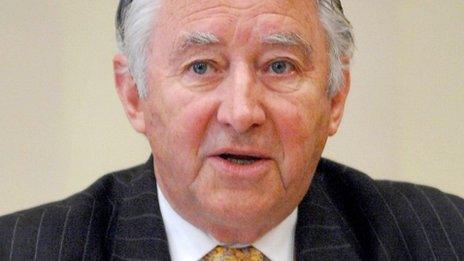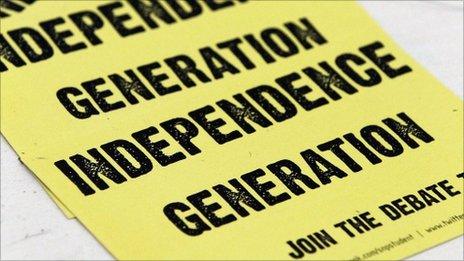Laws, conventions and popular opinions
- Published
- comments

Could Westminster hold its own referendum on the future of Scotland?
Was that not an intriguing contribution by Lord Forsyth to the debate anent the prospect of the UK Government holding its own referendum on Scottish independence?
According to the former Scottish secretary, speaking in the Lords, Alex Salmond stands ready to thwart such a scheme by, apparently, instructing the police and other agencies in Scotland to steer clear of any involvement in the UK-run plebiscite.
Mr Salmond's office say they have no idea what Lord Forsyth is talking about. I confess it is the first I have heard of any such suggestion.
However, is there perhaps a more direct Parliamentary route by which the Scottish Government might seek to forestall a UK-led poll?
You will remember the Sewel Convention under which the UK Parliament agrees to avoid any unwarranted interference in Scottish affairs without consent from Holyrood - and vice versa.
This operates, generally, via a Legislative Consent Motion, external (LCM).
Holyrood, for example, will have to carry such a motion before the Scotland Bill enhancing the powers of the Scottish Parliament is finally endorsed at Westminster.
Arguably, such an LCM would be required from Holyrood before the UK Government could pass the requisite Bill to hold a referendum on Scottish independence.
I believe that such a prospect will have occurred to the First Minister.
Effective veto
I believe he would argue that Holyrood has, thereby, an effective veto on when a referendum is held.
I believe, further, that he might well be prepared to seek to exercise such a veto in the event that the UK Government bows to pressure from those who want a pre-emptive poll.
A few points occur. Firstly, the constitution is reserved to Westminster under Schedule Five of the Scotland Act 1998, external, the legislation which created the Scottish Parliament.
Arguably (again), that might mean that it is within the purview of Westminster to act without an LCM from Westminster on the grounds that the constitution does not fall, strictly, within Scottish domestic, devolved politics.
Against that, the Sewel Convention (named after Lord (John) Sewel who piloted the 1998 Act through the Upper house as a minister) is designed to elide cross-border arguments.
One might well argue that the holding of a disputed referendum is just such an occasion. Indeed, it is perhaps a quintessential example of such a conflict.
Secondly, though, the Convention is just that: a Convention. It was designed to address the fact that, regardless of the 1998 Act, Westminster remains sovereign and can act as it pleases within the confines of law.
One senior MP suggested to me that, should the perceived need become pressing, the UK Government might choose to set the Convention aside and call a referendum.
Thirdly, might the Convention also be said to apply in reverse to any two question referendum proposed by the Scottish Government - especially if the UK Government does not like either or both of the questions?
Say the referendum includes a question which proposes that Scottish devolution powers be substantially enhanced. That would lay a potential obligation upon the UK Parliament and Government to respond.
Would that not entitle the UK Parliament and Government to be consulted, Sewel style, about the content of said referendum?
Fourthly, this comes down to political strategy.
Would it be sensible of the UK Government to introduce a referendum over the heads and against the expressed will of the Scottish Government - especially when the SG might have voiced its opposition through a negative LCM at Holyrood?
On the other hand, would it be legitimate for the Scottish Government to hold a referendum on substantially enhanced powers against the wishes of Westminster - when it would fall to the UK Government and Parliament to implement such a change?
In this area, there are laws to consider, conventions to consider - but, above all, the impact upon popular opinion to consider.
- Published30 October 2011

- Published27 October 2011

- Published23 October 2011
